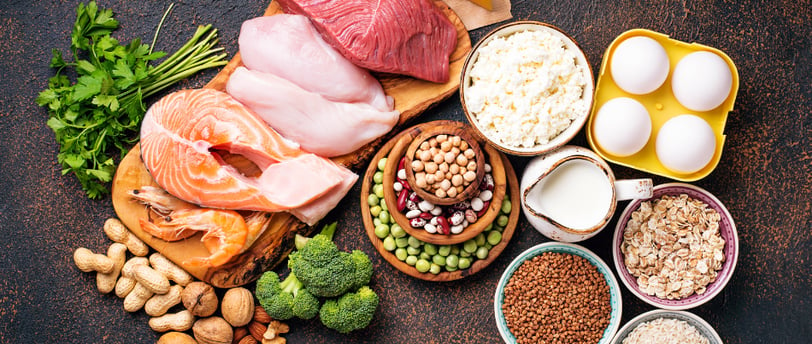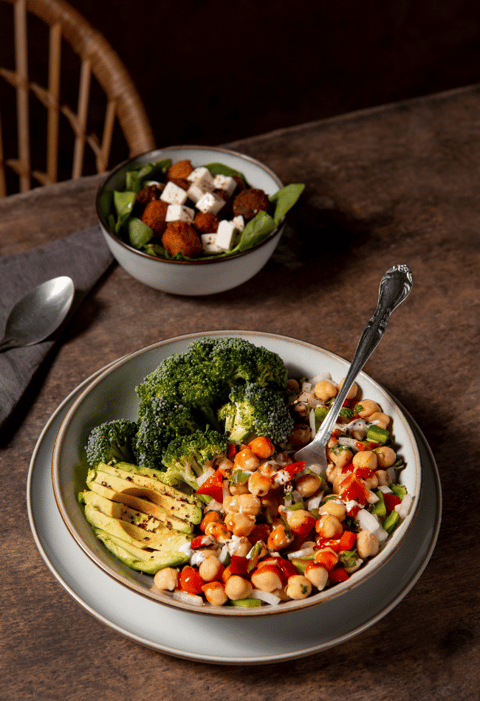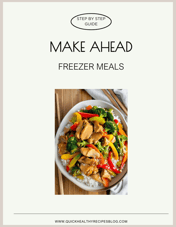Protein Rich Foods for Weight Loss
Protein-Rich Foods for Weight Loss: Discover the ultimate guide to incorporating lean proteins into your daily meals. Packed with healthy breakfast, lunch and dinner ideas, easy recipes with complete nutritional information, and expert tips to maximize your results.
HIGH PROTEIN
4/14/20256 min read


Protein-Rich Foods for Weight Loss: Your Complete Guide
Are you looking to shed a few pounds while still enjoying delicious, satisfying meals? Incorporating protein-rich foods into your daily eating routine might be the game-changer you need. Protein plays a crucial role in weight loss by increasing satiety, preserving lean muscle mass, and boosting metabolism. In this comprehensive guide, we'll explore the best protein sources for weight management, share healthy meal ideas for breakfast, lunch, and dinner, and provide expert tips to help you reach your goals.
Why Protein Matters for Weight Loss
Before diving into specific foods and recipes, let's understand why protein deserves a starring role in your weight loss journey:
Increased Satiety: Protein takes longer to digest than carbohydrates, keeping you feeling fuller for longer periods and reducing overall calorie intake.
Preserved Muscle Mass: When losing weight, your body can break down muscle for energy. Adequate protein intake helps preserve lean muscle tissue while primarily burning fat.
Thermogenic Effect: Your body burns more calories digesting protein compared to fats or carbohydrates – a phenomenon known as the thermic effect of food.
Blood Sugar Regulation: Protein helps stabilize blood sugar levels, preventing the spikes and crashes that can lead to cravings and overeating.
Metabolism Boost: Maintaining muscle mass through adequate protein consumption supports a higher resting metabolic rate.
Best Protein Sources for Weight Loss
Animal-Based Proteins
Lean Poultry: Chicken and turkey breast (without skin) provide about 26g of protein per 3oz serving with minimal fat.
Fish and Seafood: Tuna, salmon, cod, and shrimp are excellent low-calorie, high-protein options with the added benefit of omega-3 fatty acids.
Eggs: A complete protein source with about 6g per egg and essential nutrients like choline, which supports metabolism.
Low-Fat Dairy: Greek yogurt, cottage cheese, and skim milk offer protein along with calcium and probiotics.
Lean Beef: When consumed in moderation, lean cuts like sirloin or tenderloin provide quality protein and iron.
Plant-Based Proteins
Legumes: Lentils, chickpeas, and beans provide protein along with fiber and complex carbohydrates.
Tofu and Tempeh: Versatile soy products containing complete proteins with approximately 15-20g per 3oz serving.
Quinoa: A complete protein grain with about 8g per cooked cup, plus fiber and essential minerals.
Edamame: Whole soybeans offering 17g of protein per cup with fiber and healthy fats.
Nutritional Yeast: A savory flavoring that provides 8g of protein per 1/4 cup.
Seitan: Made from wheat gluten, providing about 21g of protein per 3oz serving.
Protein-Packed Meal Ideas
Breakfast Ideas
Starting your day with protein sets you up for success by stabilizing blood sugar and reducing cravings throughout the day. Here are some delicious options:
Greek Yogurt Parfait
Layer 1 cup of plain Greek yogurt with 1/2 cup berries and 1 tablespoon of nuts or seeds for a protein-rich, satisfying breakfast.
Nutritional Content: 20g protein, 220 calories, 5g fat, 20g carbs, 5g fiber
Veggie Egg White Omelet
Combine 4 egg whites with spinach, bell peppers, and onions. Serve with a slice of whole-grain toast.
Nutritional Content: 19g protein, 200 calories, 3g fat, 15g carbs, 3g fiber
Protein Smoothie
Blend 1 scoop of protein powder with 1 cup of almond milk, 1/2 banana, and a handful of spinach.
Nutritional Content: 25g protein, 240 calories, 5g fat, 25g carbs, 4g fiber
Quinoa Breakfast Bowl
Cook 1/2 cup of quinoa in almond milk, top with sliced almonds and cinnamon.
Nutritional Content: 12g protein, 280 calories, 8g fat, 40g carbs, 6g fiber
Lunch Ideas
Midday meals should provide sustained energy while keeping you satisfied until dinner:
Tuna Salad Lettuce Wraps
Mix 3oz of canned tuna with Greek yogurt, diced celery, and herbs, served in large romaine lettuce leaves.
Nutritional Content: 22g protein, 150 calories, 5g fat, 6g carbs, 2g fiber
Lentil Soup with Vegetables
A hearty bowl of lentil soup packed with carrots, celery, and spinach.
Nutritional Content: 18g protein, 230 calories, 2g fat, 40g carbs, 15g fiber
Grilled Chicken Salad
Top mixed greens with 4oz grilled chicken breast, cherry tomatoes, cucumber, and balsamic vinaigrette.
Nutritional Content: 28g protein, 280 calories, 10g fat, 12g carbs, 4g fiber
Tofu and Vegetable Stir-Fry
Sauté 4oz of firm tofu with a variety of colorful vegetables and a light soy-ginger sauce.
Nutritional Content: 16g protein, 220 calories, 10g fat, 18g carbs, 5g fiber
Dinner Ideas
Evening meals that are protein-rich help with overnight muscle recovery while preventing late-night cravings:
Baked Salmon with Roasted Vegetables
Season a 5oz salmon fillet with herbs and lemon, bake alongside Brussels sprouts and sweet potatoes.
Nutritional Content: 30g protein, 320 calories, 15g fat, 20g carbs, 6g fiber
Turkey Chili
Prepare a hearty bowl of turkey chili with kidney beans, bell peppers, and tomatoes.
Nutritional Content: 25g protein, 290 calories, 7g fat, 30g carbs, 12g fiber
Chickpea and Vegetable Curry
Simmer chickpeas in a tomato-based curry sauce with cauliflower, spinach, and spices.
Nutritional Content: 14g protein, 250 calories, 6g fat, 35g carbs, 10g fiber
Zucchini Noodles with Turkey Meatballs
Spiralize zucchini into "noodles" and top with 3oz of lean turkey meatballs and marinara sauce.
Nutritional Content: 24g protein, 260 calories, 12g fat, 15g carbs, 5g fiber
Easy High-Protein Recipes
Overnight Protein Oats (Breakfast)
Ingredients:
1/2 cup rolled oats
1 scoop protein powder
1 tablespoon chia seeds
1 cup unsweetened almond milk
1/2 cup berries
1 tablespoon almond butter
Instructions:
Combine oats, protein powder, and chia seeds in a jar.
Add almond milk and stir well.
Refrigerate overnight.
In the morning, top with berries and almond butter.
Nutritional Content per Serving:
Protein: 25g
Calories: 370
Carbohydrates: 40g
Fat: 14g
Fiber: 10g
Mediterranean Chicken Bowl (Lunch)
Ingredients:
4oz grilled chicken breast
1/2 cup cooked quinoa
1/2 cup cucumber, diced
1/2 cup cherry tomatoes, halved
1/4 cup red onion, sliced
2 tablespoons hummus
1 tablespoon olive oil
1 tablespoon lemon juice
Fresh herbs (parsley, mint)
Instructions:
Arrange quinoa as the base in a bowl.
Top with grilled chicken and vegetables.
Dollop hummus on top.
Drizzle with olive oil and lemon juice.
Sprinkle fresh herbs for garnish.
Nutritional Content per Serving:
Protein: 35g
Calories: 420
Carbohydrates: 30g
Fat: 18g
Fiber: 7g
Baked Cod with Lentils (Dinner)
Ingredients:
5oz cod fillet
1/2 cup cooked green lentils
1 cup roasted vegetables (bell peppers, zucchini)
1 tablespoon olive oil
1 teaspoon paprika
1 teaspoon garlic powder
Fresh lemon juice
Salt and pepper to taste
Instructions:
Preheat oven to 400°F (200°C).
Season cod with paprika, garlic powder, salt, and pepper.
Bake for 12-15 minutes until flaky.
Warm lentils and serve as a base.
Place cod on top of lentils.
Arrange roasted vegetables around the fish.
Drizzle with olive oil and fresh lemon juice.
Nutritional Content per Serving:
Protein: 32g
Calories: 350
Carbohydrates: 25g
Fat: 12g
Fiber: 8g
Expert Tips for Protein-Based Weight Loss
1. Distribute Protein Throughout the Day
Aim for 20-30g of protein per meal rather than consuming most of your protein at dinner. This approach helps maintain muscle mass and keeps hunger at bay throughout the day.
2. Choose Quality Over Quantity
Focus on complete proteins that provide all essential amino acids. While animal products naturally contain complete proteins, plant-based eaters should combine different plant proteins (like rice and beans) to create complete protein profiles.
3. Consider Your Total Calorie Needs
While protein is beneficial for weight loss, overall calorie intake still matters. A registered dietitian can help determine your specific protein and calorie needs based on your age, weight, activity level, and goals.
4. Pair Protein with Fiber
For maximum satiety, combine protein with fiber-rich foods like vegetables, fruits, and whole grains. This combination slows digestion and provides sustained energy.
5. Hydrate Adequately
Protein metabolism produces waste products that your kidneys must filter. Drinking plenty of water supports this process and helps prevent dehydration.
6. Use Protein as a Replacement, Not Addition
When incorporating more protein, reduce other macronutrients like refined carbohydrates rather than simply adding protein to your current diet.
7. Watch the Accompaniments
Be mindful of what you're serving with your protein. Creamy sauces, excessive oils, or fried preparation methods can significantly increase the calorie content.
Potential Pitfalls to Avoid
Processed Protein Products: Many protein bars and shakes contain added sugars and artificial ingredients. Opt for whole food protein sources when possible.
Overlooking Plant Proteins: Plant-based proteins offer fiber and phytonutrients that support weight loss beyond just their protein content.
Excessive Protein: While beneficial, consuming too much protein can strain your kidneys and potentially convert to fat storage. Most adults need between 0.5-0.8g of protein per pound of body weight.
Neglecting Other Nutrients: A balanced diet requires adequate carbohydrates, healthy fats, vitamins, and minerals along with protein.
Conclusion
Incorporating protein-rich foods into your daily meals – breakfast, lunch, and dinner – provides a solid foundation for successful weight loss. By choosing lean animal proteins, plant-based alternatives, or a combination of both, you can create satisfying, nutritious meals that support your health and weight management goals.
Remember that sustainable weight loss comes from a holistic approach that includes regular physical activity, adequate sleep, stress management, and a balanced diet – not just from focusing on a single nutrient. Consult with a healthcare professional before making significant changes to your diet, especially if you have existing health conditions.
Disclaimer
The information provided in this article about protein-rich foods for weight loss is for educational purposes only and is not intended as medical advice. Before making significant changes to your diet or starting a weight loss program, please consult with a healthcare professional, registered dietitian, or nutritionist, especially if you have existing health conditions, are pregnant or nursing, or are taking medications.
Nutritional values listed are estimates and may vary based on specific brands and preparation methods. Individual results from incorporating these protein-rich foods into your diet may vary. Weight loss success depends on many factors including overall calorie intake, physical activity, genetics, and individual health conditions.


Easy Healthy Recipes for Busy Cooks
Connect
© 2025 All rights reserved.


